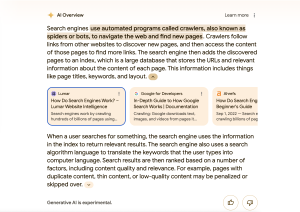Libraries Need to Change: Why Not Libraries?
When people search for information, they tend to choose the most convenient method. Google has become a powerful tool to access information quickly, but many people do not realize Google retrieves information from multiple sources (Google, n.d.). While people may generally find the information they are searching for,, the information does not always come from reliable sources of information. Without realizing it, Google users may be accessing incorrect information from their quick Google searches. Recently, Google has integrated AI which has resulted in even more misinformation being spread. Google claims, “AI Overviews can take the work out of searching by providing an AI-generated snapshot with key information and links to dig deeper” (Google Search Help, 2024). With this claim it is clear that Google is putting the responsibility on the user to check the sources of information by clicking on the additional links provided by Google, but we all know from experience that many (if not most) Google users do not usually check for the source of information leading to inaccurate information being provided. How can we get people to realize that maybe Google is not the best way to search for information, but do they know where to go for reliable sources? Will people utilize library services to supplement their need for information in light of these changes?

Information Accessibility
Not all libraries are accessible to all. The topic of library hours of operation affecting accessibility to library resources and services has long been a topic of discussion. As libraries have built on their virtual presence, the idea of the 24/7 library has been reconsidered. Virtual reference services have become increasingly popular and physical library reference services have declined significantly (Burgerm Park, & Li, 2010). Being able to access virtual reference services quickly was proven to be beneficial to library users, but the convenience factor still remains an issue libraries everywhere confront.
This brings to question: how can libraries change the way information is provided or increase accessibility to compete with large search engines? It is not just Google that is providing quick and easy access to information online – ChatGPT is also a well-known source of information for many people. How can libraries compete with the convenience and accessibility of AI and massive search engines? The implementation of chatbots has helped libraries compete in the quick search for information since the early 2000s and continues being an amazing resource for libraries to provide quick and easy access to information (Adetayo, 2023). However, most public libraries use chatbots for general information regarding library hours and providing links to additional resources as opposed to answering reference questions (Adetayo, 2023). Adetayo (2023) argues that resources such as ChatGPT can be useful for libraries to provide more convenient reference services to patrons, but the gap in literature and lack of human touch can negatively impact its usage. Libraries must consider changing the convenience of reference services as many users need access to more reliable sources of information.
Reflection
As a future information professional, I feel responsible for providing people with reliable information and informing them about the risk of relying on sources such as Google for information. I feel that we, as information professionals, must continue searching for ways to make information more accessible to all. We must realize that the library is not always the welcoming space we consider it to be – some people are intimidated by the unfamiliarity of the library, virtual and physical. We need to ask ourselves how we can continue competing with the convenience of search engines – how can we make our services less intimidating and easier to access?
References
Adetayo, A. J. (2023). ChatGPT and librarians for reference consultations. Internet Reference Services Quarterly, 27(3), 131–147. https://doi-org.libaccess.sjlibrary.org/10.1080/10875301.2023.2203681
Burger, A., Park, J. ran, & Li, G. (2010). Application of reference guidelines for assessing the quality of the internet public library’s virtual reference services. Internet Reference Services Quarterly, 15(4), 209–226. https://doi-org.libaccess.sjlibrary.org/10.1080/10875301.2010.526479
Google. (n.d.). “How search works.” Retrieved on 19 June 2024. Retrieved from https://www.google.com/search/howsearchworks/how-search-works/organizing-information/
Google Search Help. (2024). “Find information in faster & easier ways with AI Overviews in Google Search.” Retrieved on 19 June 2024. Retrieved from https://support.google.com/websearch/answer/14901683?hl=en&visit_id=638544198113892639-1230929838&p=ai_overviews&rd=1
